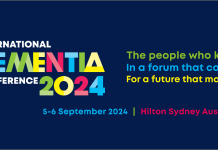Many aged care residents valued being treated with respect, appropriate health care, and their independence, a study into residents’ priorities has found.
Macquarie University Honorary Fellow, Australian Institute of Health Innovation, Dr. Kristiana Ludlow undertook a study last year to determine the main concerns of aged care residents.
In a webinar about her research conducted by Dementia Training Australia, Dr Ludlow said the participants prioritised support to manage their medical conditions and assist their personal activities.
“For medical management and they often said, ‘Well, this is the reason why I’m in care because I need my medical condition managed’,” she said.
“They also prioritised being treated with respect by staff. This included their privacy respected, being spoken to respectfully and having their preferences respected.
“And regardless of their physical needs, participants across the sample really prioritised their independence, but this was a relative term that meant different things to different people.”
The study involved 38 residents across five different sites in Queensland and New South Wales that were managed by the same providers.
Respondents were asked to sort a range of 34 key tasks into their key preferences and rank them from less important to more important.
Researchers found there were four broad areas that residents found important.
The first was maintaining a sense of spirituality and self in residential care. This involved their spiritual or religious activities, as well as their independence, privacy, and, for many with these values, placing an importance on the meals.
“For many this transition from independent living to residential scales quite difficult,” she said, pointing to their difficulty adjusting to the food in residential care in comparison to their home-cooked meals.
One resident said: “If you said to me, What’s the hardest thing about coming into care? Loss of independence and privacy would feature high.”
The second group valued information sharing and family involvement. They wanted clear communication with them and their family.
Dr. Ludlow highlighted the views of one of the respondents: “My daughter is everything to me and she does everything for me. She’s my decision-maker.”
A third group of people was most concerned about being and staying self-reliant while in care. They wanted independence, privacy, and choices about their rooms and preferred activities such as puzzles or reading.
One man told Dr Ludlow: “I like my privacy. I make my own bed and I do everything.”
And the final group held access to staff support as a key priority, especially for call bell answering, emotional support. “They really wanted that immediate support,” Dr. Ludlow said.
What was important to people was dependent on their personal situation, such as their medical conditions and ability to care for themselves.
The residents recognised those personal requirements could change, often in line with their health priorities.
Dr Ludlow said the voices of aged care residents could contribute to the framing of person-centred care.
“We found that residents wanted to receive care that aligned with their priorities and preferences, received care that was tailored to their needs and dependencies, and given the opportunity for independence that was meaningful to them as an individual and being respected by staff members,” she said.
She noted that residents’ priorities changed over time. “So, asking them as a one-off, what are your priorities, that’s not going to reflect their journey in age care.”
Further information about training and services delivered by Dementia Training Australia can be found here – https://dta.com.au/










